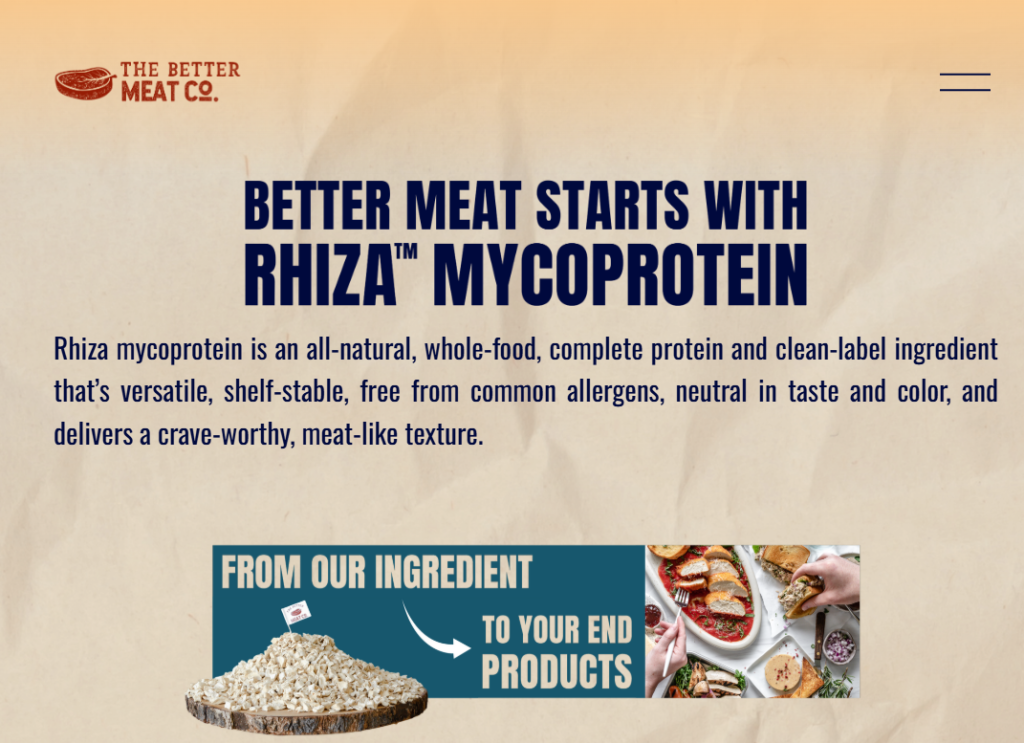The Better Meat Co. Raises $31M in Series A to Redefine the Future of Sustainable Protein
August 23, 2025
byFenoms Start-Ups

The future of food is being rewritten - and The Better Meat Co., founded by Paul Shapiro, just took another massive leap forward. The Sacramento-based alternative protein innovator announced a $31 million Series A funding round, backed by Future Ventures, Resilience Reserve, Epic Ventures, Sigmas Group, and others.
This raise signals more than capital; it’s a reflection of the changing consumer appetite for sustainable, scalable, and nutritious food alternatives. For an industry facing mounting pressure from climate concerns, supply chain fragility, and shifting cultural expectations, The Better Meat Co. is emerging as one of the most promising disruptors.
A Bold Bet on Mycoprotein Innovation
Unlike many plant-based brands chasing shelf visibility with patties and nuggets, The Better Meat Co. has taken a unique approach. Their proprietary fermentation technology uses fungi-based mycoprotein to produce whole-food, fiber-rich proteins that closely mimic the texture and nutritional density of animal meat.
This process is significantly more resource-efficient compared to both traditional livestock farming and plant-only alternatives. The startup’s focus on ingredient innovation over branded retail also sets it apart: instead of competing head-to-head with Beyond Meat or Impossible Foods, The Better Meat Co. acts as an ingredient supplier to food manufacturers, embedding its technology deeper into the food ecosystem.
Why Investors Are Paying Attention
The involvement of Future Ventures - the VC firm co-founded by Steve Jurvetson, known for early bets on Tesla and SpaceX - highlights just how transformative this technology could be. Resilience Reserve and Epic Ventures bring deep expertise in scaling biotech and food-tech companies, while Sigmas Group signals strategic interest in sustainable consumer goods.
Taken together, this diverse investor mix provides The Better Meat Co. with both financial firepower and industry reach to accelerate its expansion.
Scaling Is the Next Frontier
For any fermentation-driven startup, moving from pilot-scale labs to industrial-scale facilities is the make-or-break moment. Fermentation has the potential to deliver proteins at massive scale with consistent quality - but the economics hinge on unit cost reduction, bioreactor capacity, and downstream processing efficiency.
This Series A funding will likely go toward:
- Expanding biomanufacturing facilities to increase output.
- Improving strain efficiency to lower production costs.
- Strengthening B2B partnerships with large food companies.
- Building regulatory and compliance frameworks to expand into global markets.
The Strategic Advantage Few Talk About
Here’s something often overlooked in food-tech: distribution power matters more than consumer brand hype in the long run. While startups like Impossible Foods have spent hundreds of millions building brand recognition, the real winners may be the ingredient-first players like The Better Meat Co.
Why? Because the food system is built on B2B supply relationships. If you can become the “Intel Inside” of sustainable protein, you don’t need to fight for consumer attention - you supply to the brands that already have it. For founders, this is a powerful reminder: sometimes, the highest-impact strategy is not to be the loudest brand but to become the essential enabler of an entire industry shift.
This is the kind of leverage investors look for - a model where scaling demand doesn’t mean scaling marketing spend at the same rate. That’s why The Better Meat Co.’s positioning isn’t just sustainable - it’s smart business.
The Market Outlook for Alternative Proteins
The timing of this raise couldn’t be better. According to Bloomberg Intelligence, the global plant-based food market could reach $162 billion by 2030, up from $29 billion in 2020. Within that, fermentation-derived proteins are projected to grow at an even faster clip, driven by their superior scalability, cost efficiency, and nutritional quality compared to purely plant-based alternatives.
A 2023 Good Food Institute (GFI) report highlighted fermentation as one of the top three alternative protein technologies likely to dominate the next decade. Notably, fermentation companies attracted $842 million in funding in 2022 alone, despite a tough macro environment for venture capital.
This suggests that investor conviction in fermentation is not a passing trend - it’s a structural bet on the future of food.
Policy, Climate, and Consumer Shifts
Climate concerns are also fueling the momentum. Livestock production is responsible for nearly 15% of global greenhouse gas emissions (FAO). Meanwhile, younger consumers are demanding more sustainable options: 49% of Gen Z and 48% of Millennials in the U.S. say they are trying to reduce their meat consumption (IFIC).
That shift in values creates fertile ground for companies like The Better Meat Co., which offer products that are nutritionally dense, sustainable, and cost-competitive. Add in growing government support for sustainable food innovation - such as the USDA’s $10 billion climate-smart commodities program - and the landscape looks even stronger.
Where The Better Meat Co. Goes From Here
The $31 million raise provides not just resources, but validation. To scale successfully, The Better Meat Co. will need to:
- Continue lowering production costs per pound to compete directly with conventional meat.
- Deepen B2B partnerships with large food manufacturers and quick-service restaurants.
- Secure regulatory approvals in international markets.
- Expand its talent bench across fermentation science, supply chain, and commercial partnerships.
If executed well, the company could become a cornerstone supplier in a food system increasingly defined by sustainability and resilience.
The Bigger Picture
This isn’t just about one company raising capital. It’s about the rewiring of the global protein industry. Consumers are demanding better, investors are doubling down, and technology is finally at a point where it can deliver.
For founders and operators, The Better Meat Co. provides a clear lesson: solving for scalability, not just novelty, is what attracts serious capital and positions you for long-term impact.









